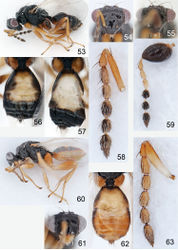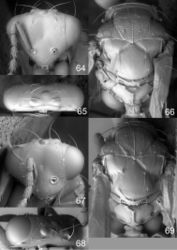Euplectrus bobwhartoni
| Notice: | This page is derived from the original publication listed below, whose author(s) should always be credited. Further contributors may edit and improve the content of this page and, consequently, need to be credited as well (see page history). Any assessment of factual correctness requires a careful review of the original article as well as of subsequent contributions.
If you are uncertain whether your planned contribution is correct or not, we suggest that you use the associated discussion page instead of editing the page directly. This page should be cited as follows (rationale):
Citation formats to copy and paste
BibTeX: @article{Hansson2015ZooKeys, RIS/ Endnote: TY - JOUR Wikipedia/ Citizendium: <ref name="Hansson2015ZooKeys">{{Citation See also the citation download page at the journal. |
Ordo: Hymenoptera
Familia: Eulophidae
Genus: Euplectrus
Name
Euplectrus bobwhartoni Hansson sp. n. – Wikispecies link – ZooBank link – Pensoft Profile
Material
Holotype a female labeled “COSTA RICA: Guanacaste, ACG, Sector Murcielago, Camino Bahia Hachal, 13.vi.2006, G. Pereira, ex Bagisara tristicta eating Herissantia crispa, sibling of wasp DHJPAR0028861, 06-SRNP-17307” (BMNH). PARATYPES: 8♀: 1♀ with same label data as holotype (BMNH, INBio); Guanacaste: Parque Nacional Palo Verde, 50 m, LN 260952/385020, 5-16.vi.1999, malaise trap, I. Jiménez (6♀, CNC, INBio, USNM); Puntarenas: Peninsula Osa, Estación Agujas, 250-350 m, LS 276750/526550, 4-20.vi.1999, swept, J. Azofeifa (1♀, INBio).
Diagnosis
Lower face medially yellowish-white with median part yellowish-brown, pale area reaching slightly outside outer lateral margin of toruli (Fig. 61); scutellum smooth medially and with very weak engraved reticulation laterally (Fig. 69); legs yellowish-brown (Fig. 60); petiole 0.5× as long as wide; gaster yellowish-brown with dark brown lateral margins (Fig. 62).
Description
Female. Length of body 2.6 mm. Antenna with scape yellowish-white in basal ½ and yellowish-brown in apical ½, pedicel yellowish-brown, flagellomeres 1–4 yellowish-brown ventrally and dark brown dorsally, 5–6 dark brown (Fig. 58). Mandibles and palpi white. Head black and shiny, lower face medially yellowish-white with median part yellowish-brown, pale area reaching slightly outside outer lateral margin of toruli, with parts between pale area and eyes black (Fig. 61). Frons close to eyes with two rows of setae (Fig. 67). Vertex smooth (Fig. 68). Occipital margin rounded (Fig. 68).
Mesosoma black and shiny (Fig. 60). Each sidelobe of mesoscutum with 13 setae. Scutellum 1.0× as long as wide; smooth medially and with very weak engraved reticulation laterally (Fig. 69). Dorsellum along anterior margin with a groove that is very narrow laterally and wide medially, medially 0.4× as long as length of dorsellum, groove is divided by longitudinal carinae (Fig. 740). Propodeum partly with very weak reticulation and partly smooth (Fig. 740); anteromedially with a short and wide triangular cup; propodeal callus with 12 setae. Legs yellowish-brown (Fig. 60). Fore wing: costal cell with two rows of setae on ventral surface, and margin with two setae close to marginal vein; with 24 admarginal setae, in two rows.
Gaster yellowish-brown with dark brown lateral margins (Fig. 62).
Ratios. HE/MS/WM = 2.1/1.0/1.3; POL/OOL/POO = 6.7/3.8/1.0; OOL/DO = 1.4; WE/WF/WH/HH = 1.0/2.6/4.6/3.5; WH/WT = 1.1; PM/ST = 1.2; TS1/TS2/LT/LT1/LT2/LT3/LT4 = 3.2/1.7/6.0/1.8/1.3/1.0/1.7; LP/WP = 0.5; MM/LG = 1.0.
Male. Unknown.
Hosts and biology
Feeding on penultimate instar larva of Bagisara tristicta (Noctuidae) feeding on Herissantia crispa (Malvaceae), parasitoid cocoons stuck to dead larva and substrate.
Distribution
Costa Rica (Guanacaste and Puntarenas Provinces).
Etymology
This species is named after Bob A. Wharton, in recognition of his contribution to the understanding of ACG Hymenoptera taxonomy.
Original Description
- Hansson, C; Smith, M; Janzen, D; Hallwachs, W; 2015: Integrative taxonomy of New World Euplectrus Westwood (Hymenoptera, Eulophidae), with focus on 55 new species from Area de Conservación Guanacaste, northwestern Costa Rica ZooKeys, (485): 1-236. doi
Images
|


